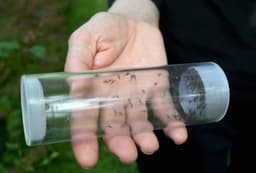Home / Environment / Wisconsin Residents Demand Action on Plastic Waste as COP30 Convenes
Wisconsin Residents Demand Action on Plastic Waste as COP30 Convenes
17 Nov, 2025
Summary
- Nations gather for UN climate summit COP30 in Belém, Brazil
- Plastic pollution a key focus, with 22 million pounds entering Great Lakes annually
- Milwaukee initiatives like Boomerang Bags work to reduce single-use plastics

As the world's nations gather in Belém, Brazil, for the annual UN climate summit known as COP30, the issue of plastic pollution has emerged as a key focus of the discussions. This comes ten years after the Paris Agreement united more than 190 countries around shared climate goals, including the aim to limit global temperature rise to 1.5°C above pre-industrial levels.
While progress has been made in some areas of environmental protection, the World Health Organization has warned that climate change poses a "fundamental threat to human health," with rising respiratory and cardiovascular diseases, heat-related illnesses, and the spread of infectious diseases. Reducing plastic production and consumption is seen as a crucial step in addressing this crisis.
In Wisconsin, the problem of plastic pollution is particularly acute. A 2016 study found that more than 22 million pounds of plastic enter the Great Lakes each year, with half of that ending up in Lake Michigan. Local initiatives like Plastic-Free MKE in Milwaukee are working to eliminate single-use plastics and reduce microplastics in the city's waterways. However, a state-level law in Wisconsin prohibits local communities from taking the simple step of banning single-use plastic bags, tying the hands of cities and towns that want to protect their environments.
As the COP30 summit continues, the world is taking stock of the progress made since the Paris Agreement. While individual actions can make a difference, policymakers and citizens alike must demand enforceable action to address the plastic pollution crisis and protect both planetary and human health.



